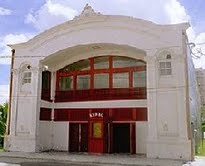Overtown: Is this Teele's Legacy?
August 4, 2010 • By Ana Guthrie
 Last week, I watched a poignant hour-long documentary-Miami Noir-on Arthur Teele, the late Miami County Commissioner who tragically committed suicide at the building of The Miami Herald.
Last week, I watched a poignant hour-long documentary-Miami Noir-on Arthur Teele, the late Miami County Commissioner who tragically committed suicide at the building of The Miami Herald. Teele is remembered for his controversial 15-year political career. At his best, he helped bolster Miami's Overtown region by improving parks, libraries and businesses. At his worse, Teele was entangled in a criminal debacle that included allegations of fraud, corruption and money laundering. He was never found guilty of any of the latter charges since he took his life on July 27, 2005 amidst the criminal investigations.
Posthumously, his lone conviction of threatening a public servant (officer) was overturned and all other charges were exonerated.
Produced by two University of Miami film students, Miami Noir marries re-enactments, testimonials from Teele supporters and co-workers, interviews with several current and former Miami Herald and Miami New Times reporters, comments from City of Miami Police, news clips, political footage and more.
Although vivid, thoroughly researched and well-organized, Miami Noir remains bystanding and non committal in that it did not paint Teele as either a fallen hero or a doomed villain. Yet, the film does pose one absolute: Teele was complex.
Since Miami Noir's airing on July 27, the 5-year anniversary of his suicide, many continue to argue what Teele's outcome would have been had he not taken his life.
Could it be that Teele's legacy is just as forlorn as the Overtown community that he served?

In 2009, the Historical Museum of Southern Florida featured a fabulous exhibit entitled, Blacks in Miami which explained Overtown's rich history. The parcel of land was originally purchased by Henry Flagler who needed an area for his workers to reside as they built train tracks at the turn of the 20th century. Later, a short commute across the bridge took most Blacks to work at either South Beach's bustling district or the port of Miami. Hence, the neighborhood became known as "Overtown."
Sadly, Jim Crow's strict segregation laws meant that Blacks were rarely allowed on South Beach (as well as Coconut Grove) except as laborers and clerks. All Black workers presented identification before being allowed across the bay. Occasionally, Black musicians were permitted to perform for whites at South Beach night clubs.
 For Blacks, though, landmarks like the Lyric Theatre, Mt. Zion Baptist Church, Dorsey Hotel, Jackson's Soul Food and Booker T. Washington High School (among others) remained the centers of community. Blacks maintained their own barbershops, grocery stores, pharmacies and more. Indeed, the region represented Black prosperity.
For Blacks, though, landmarks like the Lyric Theatre, Mt. Zion Baptist Church, Dorsey Hotel, Jackson's Soul Food and Booker T. Washington High School (among others) remained the centers of community. Blacks maintained their own barbershops, grocery stores, pharmacies and more. Indeed, the region represented Black prosperity.Decades later, Overtown saw division and upheaval as interstate hig
hways erected. The Black middle and upper classes were bought out in order to make room for expansion. And, later still, the remaining Blacks began to migrate toward the northern end of the county.
Today, Overtown is the poorest neighborhood within Miami-Dade. Drugs, prostitution, and violence continue to be a problem even after millions of dollars have been poured into the region.
A Reagan Republican, Arthur Teele relocated from Washington D.C. to Miami to enact change in Overtown and the rest of District 3. Once on the county's commission, he chaired the Community Redevelopment Agency which handled Overtown's economic and infrastructural makeover. Teele was accused of manipulating his county commission seat for personal gain in the form of many kickbacks, or under the table deals, with drug lords as well as business owners. There were even reports of his being linked to male and female prostitutes.
Last Tuesday, the anniversary of Teele's death and the day Miami Noir aired on PBS, many cherished Teele's memory by celebrating at a butterfly garden dedicated in his honor. Moreover, local artist Adonis Parker unveiled a tribute mural painted along the west side one of Liberty City's I-95 off-ramps, just a few yards away from the small Art Teele garden.
Despite the honors, Teele's suicide continues to divide Miami. Some consider him a Black martyr who was fatally dragged down by conspirators while others deem him a heartless vagabond who thought he was above the very law he pledged to uphold.

I believe that-whether guilty or not-Teele's trajectory mirrored that of Overtown. Sadly, he went from darling, prosperous newcomer in his heyday to seared, "typical politician," as some argue, toward the end.
Similarly, once a pillar of strength in the South Florida's Black community, Overtown now struggles. Even after the Teele days, Overtown battles homelessness, murders, burglaries, prostitution and rampant drugs. The good news is the region is now led by promising leaders: City Commissioner Richard Dunn II (who, ironically, replaced another of Miami's controversial, suspended Black politicians, Michelle Spence-Jones) and County Commissioner Audrey Edmonson.
I pray that Teele's family continues to heal and Overtown manifests its long-awaited transformation.
To view Miami Noir in its entirety, go to http://www.snagfilms.com/films/title/miami_noir_the_arthur_e_teele_story/?sms_ss=email
Or, to purchase the film for a mere $5, go to http://miaminoir.blogspot.com/
Related Articles · More Articles
The public charge rule that rendered immigrants inadmissible or ineligible for green cards if they accept government assistance was overturned in September and new rule, allowing immigrants to receive food stamps, healthcare services and other government aid, took effect December 23, 2022.
This Christmas, R&B singer-writer-producer Ne-Yo, stars in the BET+ original holiday remake of “The Sound of Music" directed by Booker Mattison.
Trump is like an aging boxer well past his prime, who does not know when to quit. Yet, which political stands in the wings? I think we all know.

